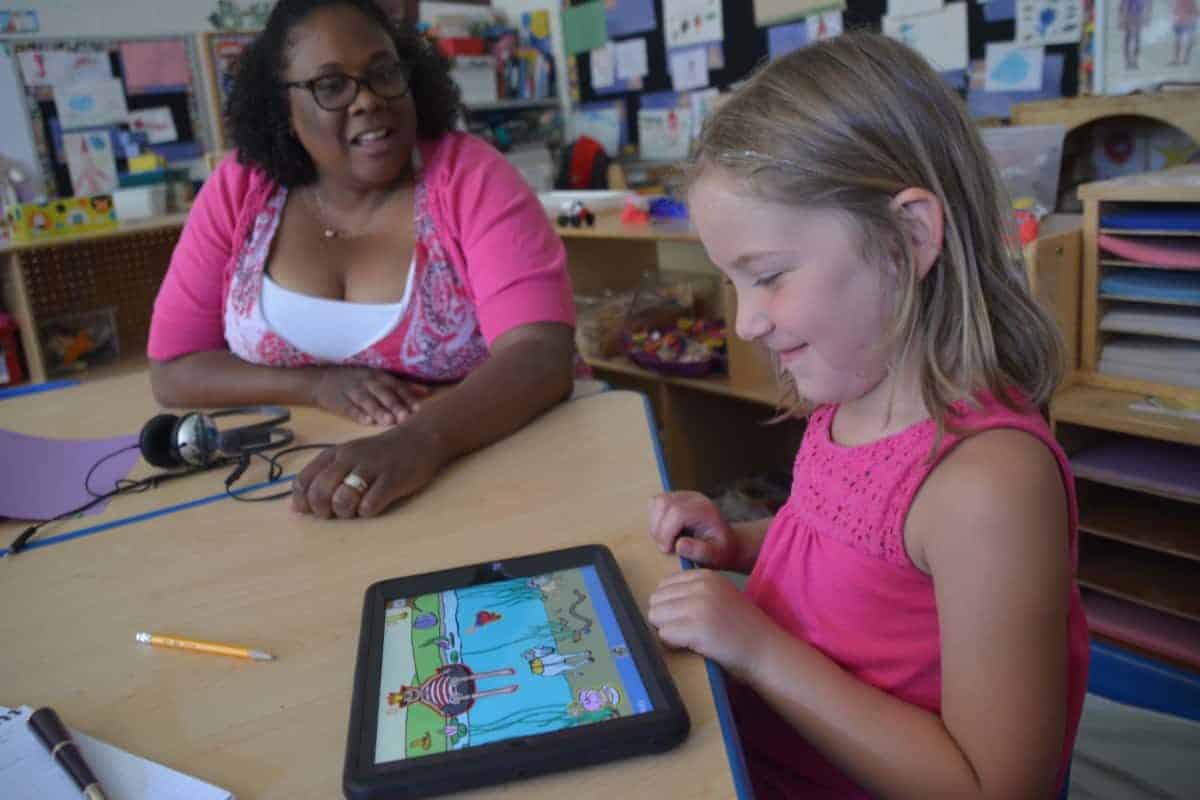

“Remember, this is to help you learn how to read,” said an enthusiastic voice from a tablet in the hands of Molly, a pre-K student at Perry Harrison Elementary in Chatham County. Molly is walking me through SmartStart, the in-class version of Upstart — the software the House budget is proposing to give to at-risk children who are not in formal preschool settings. Both are online programs from Waterford, a Utah-based organization.
“I don’t know how to read yet, but I know how to read some books,” Molly said. The game she is working on has pictures of different objects, and the same enthusiastic voice is prompting the user to choose the object that rhymes with a specific word. “If something rhymes, you press on it,” Molly said. “But if you get it wrong, that’s okay.”
Molly struggles with finding an object that rhymes with “quail.” She clicks on a piece of cake. “The ending parts don’t sound the same,” said the voice. After a few incorrect guesses, the program prompts Molly to ask her teacher for help.
Jennifer Ruff, Molly’s lead pre-K teacher, comes over to the table. She further explains rhyming words. “So it’s not the beginning sounds like we’ve been doing,” Ruff says. They end up choosing a picture of a pail. For the next prompt, the word is “goat.” “What about snake?” Ruff says. “No,” Molly says. Molly picks on the picture of a coat. They work through another one together: “king,” and “swing.” “Yes! You’re brilliant!” Ruff says and gives Molly a high-five.
Since January, Ruff said her classroom has used SmartStart as a choice for students during centers. Some children also use the program at home. She said parents of those children have enjoyed being able to see what their children are learning and helping them at home. Ruff said she has seen students improve in letter and number recognition and counting. She finds students singing the songs from the program often.
“They always seem to want to use it,” Ruff said. “It’s not like we have to make anyone. But we use it as centers, so it’s not like what we do all day. It’s part of our rotation.”
Ruff said the program also helps her identify points of struggle for students and provide extra support in those areas. As an example, she said she may give Molly some extra help in a different center later in the week to help with word families.
“It helps us be able to plan more activities for the children not just using the computer, but actually activities where they get to play with toys and work together,” she said.
Upstart, the version of the program that — if it shows up in the final budget — would be given to children in a three-year pilot program for at-risk children who are not in preschool in up to 10 school districts in North Carolina, is somewhat different than SmartStart, said Kim Fischer, Waterford’s public relations manager. The main difference, she said, is Upstart is adaptive.
“SmartStart is basically timelined, so all the kids start at the same point, end at the same point,” Fischer said.
Upstart, on the other hand, focuses more on areas of struggle until the child grasps the content area. Instead of prompting the child to ask for help, the program keeps providing other options until the child picks the correct answer.
“With Upstart, the software will be able to tell when the child is not answering questions about a specific topic correctly, then continue to rephrase the questions until the child understands it,” Fischer said in an email.
Since a House bill proposing the program was heard in an education committee in April, concerns have arisen around screen time, a lack of social and emotional development, and that the funding could be used better for expanding NC Pre-K, the state’s brick-and-mortar preschool for at-risk 4-year-olds.
Virtual early learning program director: ‘We are not here to replace anything’
Carrie Little, Chatham County Public Schools’ executive director of federal programs and school improvement, said Waterford’s programming caught her eye because of the outcomes she saw while researching it. She said the district pays around $20 per child for SmartStart. She gave pre-K teachers across the district the option instead of requiring the program, and five of them chose to use it. She said, starting next year, they are using Waterford to benchmark a new cohort of 4-year-olds three times a year to see if the program is making a difference.
“You always want to try to provide supports in different ways to differentiate for children,” Little said. “Our children are different now than when you and I were in school, so just finding different types of learning tools, and these are tools. These are supplementary tools to help support what’s happening in the classroom.”
The House budget includes $1 million in non-recurring funds for the program. Fischer said public funds would also be used to provide internet connectivity and devices, when needed, to families. She said the program will also send emails to to parents to update them on how their child did on the program for the past week and suggest offline activities related to the areas they are learning on the program. Fischer said the program is only 15 minutes a day and that family educational liaisons work closely with parents and encourage them to limit screen time and seek opportunities for social-emotional development.
Ruff said she sees the program as one tool. The most important piece of how she prepares children for kindergarten, Ruff said, can not be provided online.
“We learn through play, and they need that piece more than anything,” Ruff said. “… I think that you need all aspects for a child. They need to go to our hour outside. We need to make sure that they are working together. They need to be present with each other. They need to understand that they are cared for and that they are respected, so that way you can get to that ultimate goal and prepare them for kindergarten.”
Ruff said she wishes funding was available for more children to have access to preschool.
“Funding needs to be there, because yeah, you can get that part at home, but can you get the social-emotional part? Can you get that respect for each other? Can you get that learning avenue of ‘You’re a class family, and you can work together?'”
Tweet at me @llizabell with your questions about Upstart.
Editor’s Note: Smartstart, the early learning software from Waterford, is different than Smart Start, the statewide network of local partnerships in North Carolina that facilitate early childhood funds.


